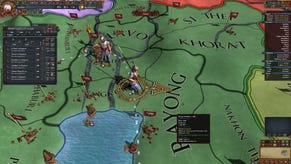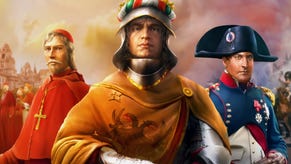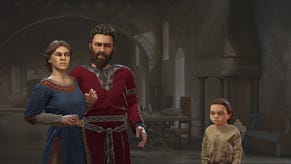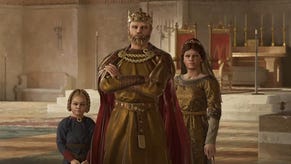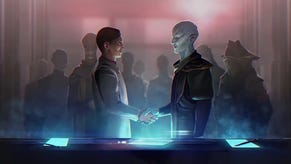Learning From The Past: Europa Universalis IV
Trade Into Significance
Europa Universalis IV won't be out for a long time but it's already looking polished and that could be the most important fact of all. Whatever new features are in place, whatever old ones have been kicked to the courtly curb, the time that Paradox Development Studio are spending to make the sequel the most stable entry in the series is clear evidence that previous praise hasn't drowned out criticism and commentary. In terms of development and content alike, this is a timely tale of choices, consequences and progress.
Crusader Kings II showed a commitment to improvement, not only in design and content but also in quality control. I spoke with Paradox Interactive CEO Fred Wester and, among many other things, we discussed the frequent comments that greeted Paradox grand strategy titles in the past: "I'll wait for the complete edition, when the game should actually work". Reading those comments, which he and the team do, wherever they might crop up, can be "like a slap in the face", he says. Then he adds, "That's a good thing though. It can be a good thing."
Mistakes have been made, Wester and the studio know that, although that doesn't mean they're not proud of their history of histories, and rightfully so. Europa Universalis is the tentpole around which the rest of those past times unfurl, with the torn flags of imperialism and total war snapping from their staffs and landing, muddied and bloodied, in the 'future' ages of Victoria and Hearts of Iron. In the fields behind, garish and regal, the banners of Rome and the crusaders stretch back to antiquity. But everything, originally, hinged around the three hundred years of history covered by EU.
Now, seeing an early version of the fourth game in action, it seems the lessons of the past are working their way into the new. There is a greater emphasis on character, although it would be too much to say all of that is borrowed from Crusader Kings II. So let's not say borrowed; let's say notes have been taken. The qualities of a ruler are visible as numbers and the more impressive those numbers, the cheaper the resource cost to carry out various actions.
A great military leader, backed up by generals of worth, will find that waging wars does little to sap his nation's energy, but if he were to die, perhaps while waging a particularly violent war, then a new ruler would be elected or would inherit. The wars, regrettably, don't magically cease to be a problem when the chap who started them shuffles off this mortal coil, so if the next leader in line has a poor military rating those previously effortless conflicts are suddenly going to become a lot more expensive. But, hey, maybe the new chap is most intriguing, in which case he might be able to sue for peace and pursue diplomatic solutions.
This way the thrust of action comes from the nation, a more imposing entity than the solitary man, no matter how powerful, and that is in keeping with the times. The age of the ruler as head and heart of a people has passed. Any decisions are balanced by the cost of pursuing a particular action. Well, that and planning ahead. A wise player will try to have a contingency plan, particularly when a ruler is old and/or weak, rather than committing all resources to one course of action. To allow for intricate and divergent plans, magistrates are gone, which could actually be one of the biggest changes. Taking away the limit that magistrates place on certain actions complicated the game and made those options feats of micromanagement rather than pure choice. The impression I have of Europa Universalis IV, at this very early stage, is that there is a desire to make player choice the true source of power, ensuring there is always something to do and always a mistake to be made.
And mistakes will be made. One of the key messages that came through when talking to the developers was the desire to have a game whose graph is one of peaks and troughs, thereby all but avoiding the very notion of an 'endgame'. It is possible to begin, after all, at the very apex of power, just as it is possible to begin at the bottom of the barrel, scraping around for respect and resources. One person's genesis is another's goal. Thereby, over the course of the centuries, a game of Europa Universalis IV can have many victories and many failures, but none of them should be considered final. The mightiest empires fall and the vagaries of history can place spanners in even the most majestic works of men. Every potential 'endgame', a mire of overfaced management, could become another beginning. All it takes is one bad decision.
The feature that Paradox seem most keen to show off at the moment, at least to me, is trading. Perhaps, with my being English, they mistook me for a shopkeeper. Or maybe they were demonstrating the means by which my tiny island home once ruled the world. Dabbling in trade sees routes painted across the waters and it's possible to use merchants at the markets that form the termini of these routes, either establishing themselves there, wresting control, or converting goods into cash. Ideally, control of the sea is twinned with control of the actual trade centres, for even if the route is strong, foreign merchants may divert a percentage of the earnings to their own filthy money-holes. This is not good, but it is a method by which the unwarlike and hydrophobic can hope to gain an advantage. There are different flavours of trading nation; those who control the gateways as well as those that control the seas.
Presenting important choices at every interval is all well and good, but if those choices aren't clear then possibilities are left untouched. To feel in control, a player needs to know his options and a great deal of work has already been done to make the interface more user friendly. This doesn't mean taking control of detail away from the player, but rather ensuring the screens flow in a manner that reveals rather than conceals. Even the removal of magistrates can be seen as an addition seeing as a lack of them could be so restricting. If there is discord, a single screen now explains why it is occurring, in which provinces, and to what extent. A click of the mouse takes the player to any of the provinces in question and presents options for correcting the issue. It's not as simple as that perhaps makes it sound, but relevant information is never too far away when a situation is examined, whereas previously it has been necessary to rely on knowing the location of every last detail. Consolidation and flow seem to be the goals as far as interface is concerned, and it already looks like another step forward from Crusader Kings II.
The engine is far prettier as well, with the seasons changing and painting the north of the world white as winter creeps across the land. Speeding up the game and watching the transformations wrought upon it by nature and men is an aesthetic pleasure as much as an intellectual one, the landscape in a cycle of freeze and thaw, peace and war. As well as being attractive, like the improved flow of information on the windows, the map communicates information and it does so in an elegant fashion.
There's so much that Paradox are holding back and they're enjoying holding it back. Teasing a feature here or a menu option there, hoping to start speculation and discussion. I wouldn't be surprised if one reason for that is to feed off the opinions of the ever-observant community that is watching their progress, and why not? One of the greatest lessons of the past is that it's always possible to improve and it's always important to listen. Much can be disregarded but so much can be discussed and toyed with as well.
A feature list will never explain Europa Universalis IV because the biggest difference appears to run deeper than that. Put all the elements in place and then leave a massive amount of time to test, to alter, to add, to discard and to improve. There's a great well of experience to draw on and all the time that's needed to make sure this is the best Europa Universalis yet. And, yes, it's only that same 'time' that will tell but, for now, I'm content with the notion that patience can be the greatest virtue of all.






